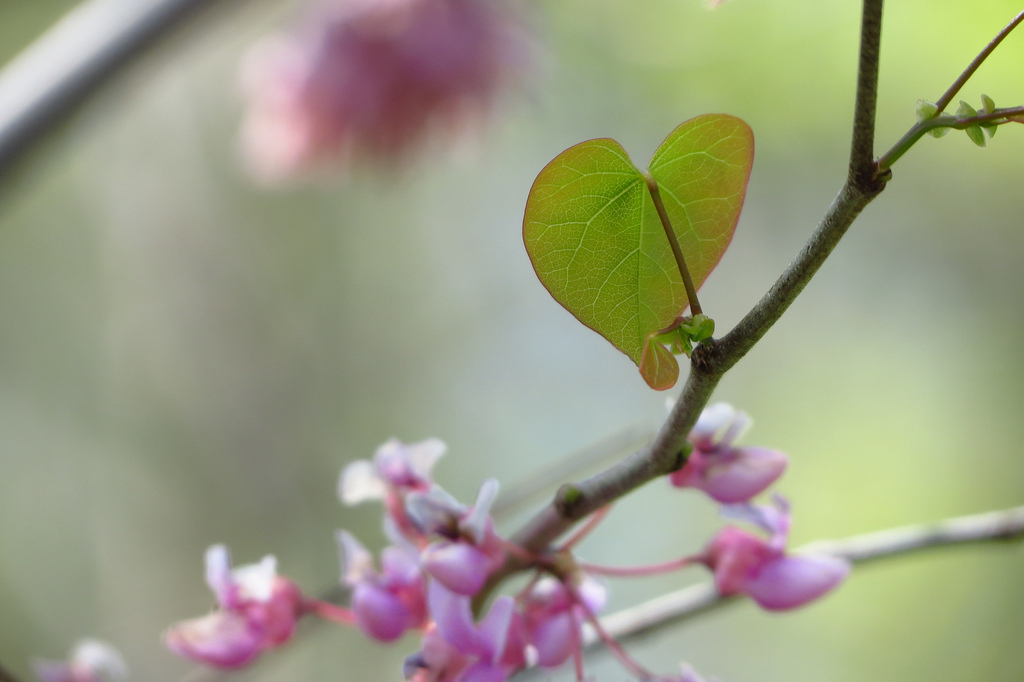Networks for Social Change: A Love Story
February 19, 2019 Leave a comment
Photo by tracydekalb, “Redbud Love,” shared under provisions of Creative Commons Attribution license 2.0.
The following post was originally published in 2014, and has been edited. In many ways it feels even more relevant five years later …
Over the past dozen years or so at IISC (our half-life as an organization, and my whole life as a member of this amazing community), we have seen and experienced some interesting progressions. In our Facilitative Leadership for Social Change trainings and consulting work, we talk about the “interior condition” of effective collaborative and network leadership. When I first joined the organization, we used to say that collaborative leaders and change agents embraced an ethic of “service, authenticity and respect.” Then we made the move of changing “respect,” which came across to some as a bit weak, to LOVE. For the first couple of years after making this switch, when we asked “What’s love got to do with it?” with respect to effective leadership and work for social change, there were definitely some uncomfortable silences. Some participants would ultimately want to rename love as “respect” or “passion.”
Then in 2009 we started noticing a change. More heads nodded in rooms when we mentioned the “L-word,” less nervous laughter and shifting in seats. In one particularly striking instance, during a training with health care and public health professionals, a senior and very respected physician responded,
“What’s love got to do with it? Everything! Beyond my technical skills, I am effective in so far as I am able to really see my patients, students, and colleagues, to make them feel seen for who they are.”
As noted in past posts, at IISC we have been drawn to and often use the work of systems biologist and philosopher Humberto Maturana when talking about love. Maturana has written that love is “seeing the other as a legitimate other,” and that, as a collective orientation, it can make a living system more intelligent. While this might lack a certain spiritual and/or emotional punch, we’ve found that if we sit with what it means to embrace the fundamental “legitimacy of others” – their being, their experiences, their perspectives – it is quite profound and challenging. And indications are that it can yield amazing and wide-ranging benefits.
For example, clinical psychologist Barbara Fredrickson has devoted much of her research to the resilience-inspiring and liberating impacts of love. An emotions scientist, Fredrickson has experimentally tracked the capacity of love – “moments of warmth, connection and openness to others” – to open people up:
“Your outlook quite literally expands as you come under the influence of any of several positive emotions. With this momentarily broadened, more encompassing mindset, you become more flexible, attuned to others, creative, and wise. Over time, you also become more resourceful.”
Fredrickson and her colleagues at UNC’s PEPLab have also noted the ability of love and related “emotional states” to eliminate the phenomenon of “own race bias.” In other words, love can help liberate people from some implicit biases and self-imposed boundaries.
In an increasingly interconnected and inequitable world, this bears great promise, which is why at IISC we uphold three integrated lenses for our collaborative capacity building work:
- networks,
- power/equity/inclusion, and
- love as a force for social transformation.

Photo by Richard Ha, “LOVE,” shared under provisions of Creative Commons Attribution license 2.0.
In 2009, writer and activist Michael Edwards said in a talk entitled “Love and Networks,”
“Only by operating from the space where we are joined together in some deeper sense are we likely to find common ground in facing up to the collective problems that confront us, with some of our differences intact.”
In various spiritual and contemplative communities that we are connected with, love is upheld as a necessary force for holding historical and ongoing atrocities, othering and ecological destruction. We are seeing the power of this in much of our network and collaborative capacity building work, including several years of supporting Food Solutions New England (FSNE), a regional network and strategy development effort working for just, sustainable and democratically owned and operated food systems.
While there is much to be done technically to retool and create structures and infrastructure to achieve the 2060 Vision of the region producing at least 50% of what is consumed here, considerable work also lies at personal, interpersonal and cultural levels to heal from long-standing oppression and extractive practices. For this reason, in meetings of the FSNE Network Team, and in larger convenings, the emphasis is always on building a deeper sense of connectivity and belonging through practices.
The importance of these practices was echoed in a recent conversation convened by Bruce Evan Goldstein and Lynn Decker of the Netweaver Network, with a few network coordinators and facilitators focused on food justice, regenerative agriculture and fire resilience. A few of us quickly and naturally fell into talking about the role of love in advancing and cohering networks. Practices to cultivate love showed up in the following ways in these different networks:
- Building trust with one another
- Speaking our truths and stories to one another
- Connecting holistically through mind/heart/spirit
- Cultivating a shared and evolving sense of purpose
- Honoring difference and the complexity of ourselves and others
- Developing the collective courage to jointly challenge entrenched power
- Staying curious about what different people need and what they can provide
- Displaying an ongoing ethic of welcome/hosting to all
- Cultivating creativity and vulnerability – singing and dancing, improv(ising)
- Working/talking/meeting equitably outside of cultural comfort zones, amidst diversity
- Leaning into deep mutual learning, saying “I don’t know” and staying open to change
- Celebrating/appreciating one another and one another’s successes

Image by makelessnoise, shared under provisions of Creative Commons Attribution license 2.0.
What all of this is adding up to is the sense that our collective ability to really see and be with one another across differences and with a view towards equitable belonging is absolutely critical to long-term thriving and resilience.
A couple of favorite quotes capture the essence of what love has to do with net work for and as social change. The first comes from Mary Parker Follett going back nearly 100 years:
“Democracy is an infinitely including spirit. We have an instinct for democracy because we have an instinct for wholeness; we get wholeness only through reciprocal relations, through infinitely expanding reciprocal relations.”
And more recently from Professor john a. powell:
“There is a need for an alternative vision, a beloved community where being connected to the other is seen as the foundation of a healthy self, not its destruction, and where the racial other is seen not as the infinite other, but rather as the other that is always and already a part of us.”
May it be so.

Image by Sandrine Rouja, “Oneness,” shared under provisions of Creative Commons Attribution license 2.0.
